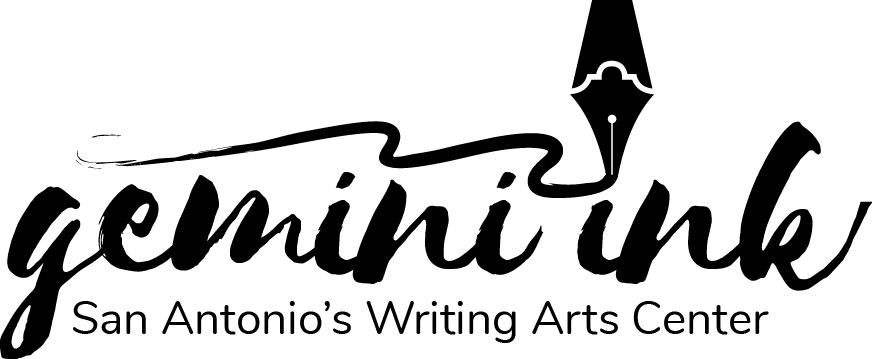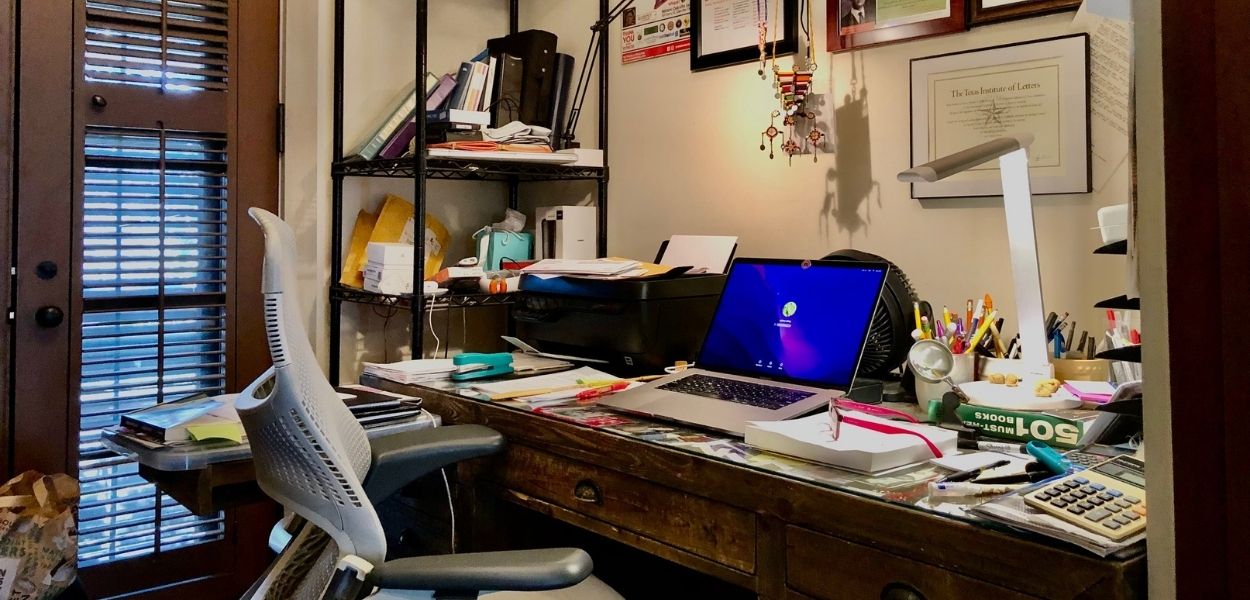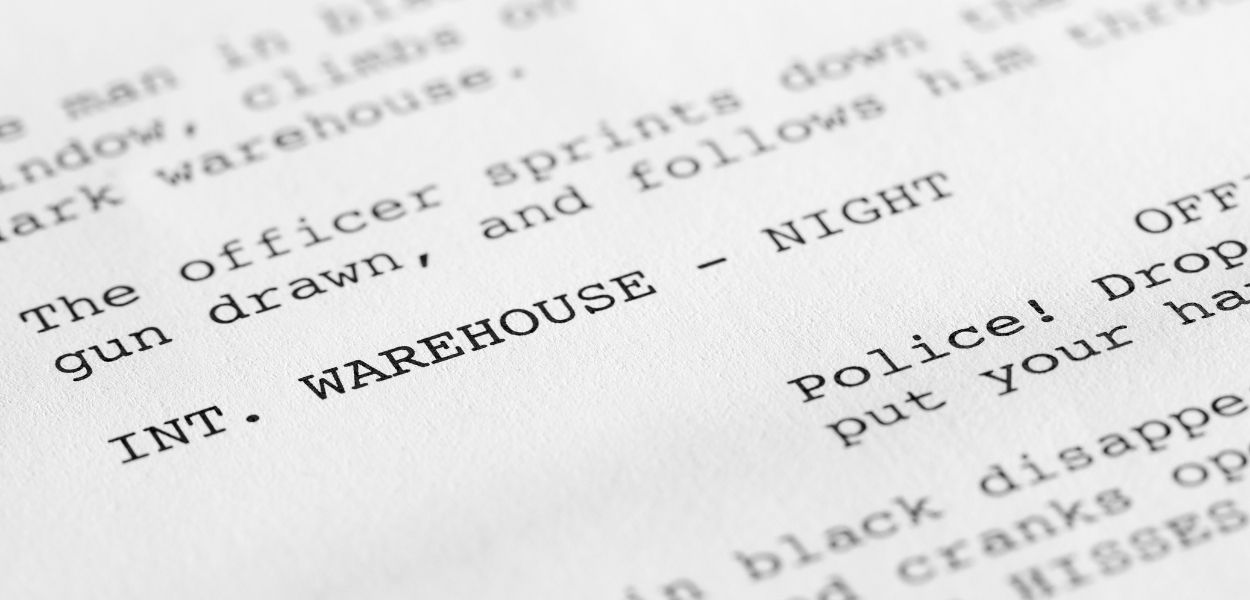The Writer’s Desk features the desks and writing practices of Gemini Ink faculty, visiting authors, teaching artists, volunteers, students, interns, staff, partners and more. Receive new posts in your inbox by subscribing to our newsletter at bit.ly/geminiinknewsletter.
Join William Jack Sibley on Wed., Feb. 23 & Mar 2, 6:30-8:30pm CST, for his workshop: The Attuned Art of Writing Dialogue. Gain expert advice on what makes for unique dialogue that “sells” the writing for the reader—whether for a novel, play, film, or TV series.
Describe your first writing desk. How is it different (or not) from your current writing desk?
I think my “first” writing desk was a kitchen counter or a dining room table. I do recall at one point writing my first screenplay out at my grandparents’ camphouse on their ranch – no landline, no cellphone, no internet, no tv – and sitting at a simple wooden school classroom desk. (Where my grandmother got that antique I wish I knew.)
Has your preferred place to write changed over the years?
What has been most helpful is to go somewhere, anywhere, that I don’t have to think about anything but putting words on paper. For me, it’s essential to clear the brain from routine and just…concentrate!
Do you have any habits or routines that you follow before writing?
Get up with black coffee and hammer out 5 good pages before you “start” your day. It’s much easier said than achieved – but one must strive for consistency.
What theme or symbol often emerges in your work? Why are you drawn to this?
Being the outsider looking in.
Love – looking for and avoiding simultaneously.
Reporting my view of the world with humor and (hopefully) some compassion.
Do you like things to be carefully planned out or do you prefer to just go with the flow? Does this also apply to how you lay out a story?
It helps me greatly to have a title in my head and a one or two sentence pitch of a story idea. But overplanning and overthinking and posting stickem notes all over a room hinders (for me) the wonderful and elegant surprises that come by just doing the day-to-day grunt work.
Is there anything you’ve been listening to lately – an interesting podcast, a song list, or album?
I read somewhere once that John Lennon only listened to “muzak in elevator” music. Apparently, it served as a “filter” allowing him to concentrate on his own music. I (alas – it costs money to license song permission) frequently refer to music in my work. For example, Here We Go Loop De Loop.
What is one piece of writing advice that you value most?
You’re the only person on the planet that can tell it your way – that’s your gift. Doing it skillfully, entertainingly, and necessarily– that’s your job.
What is your secret talent? Does it ever pop up in your writing?
I’m a natural mimic. I “hear” people – not necessarily what they say but specifically how they sound. There’s a difference. Know your characters all the way to their hair roots! And yes, it “pops” in my writing on every page.
What’s a book or movie that you can watch over and over again and not get tired of?
Film – The Last Picture Show and A Room With A View.
Book – A Confederacy Of Dunces.
Who are your heroes in real life? What do you admire most about them?
Larry McMurty, Jane Fonda, Nina Simone, Albert Schweitzer, Jackson Pollock – all individuals who didn’t follow the herd.
What is your motto? Does it also apply to your writing?
“Many are called, few are chosen” – Makes me try a little harder.
What habit do you have now that you wish you had started much earlier?
DISCIPLINE!
Who are your favorite writers? And who is your favorite hero/heroine in fiction?
Larry McMurtry, John Kennedy O’Toole, Maya Angelou, Eudora Welty, Tennessee Williams, Truman Capote, John Rechy, Tomas Rivera – all southern U.S.A. writers. Favorite hero? I’m still partial to Peter Pan.
Which fictional character would be the most boring to meet in real life? Why?
I’m afraid most characters from any John Updike novel would have my eyelids descending after five minutes.
Which words or phrases do you most overuse?
“You know?” “Does that make sense?” “On the other hand…” (The dreaded, “no problem” will never be uttered from my lips. The correct response is “you’re welcome,” “thank you,” or “have a nice day.” Why should it ever be a “problem” by one simply doing the right, kind and proper thing?)
What are some misconceptions about being a writer that you can discredit?
That we’re all fabulously interesting people leading fabulously interesting lives. (Only marginally so when compared with the rest of the populous.)
What’s the most interesting thing you’ve heard or read recently?
That somehow banning certain books in Texas school libraries will prevent white children from having inferiority complexes – huh?
Does good writing result from best practices, magic, or a bit of both?
Good writing – all writing – comes from screwing your butt into a chair and opening your mind to possibility.
What is your next project?
Never discuss the fantasy in your head you’re about to give birth to.
If people want to learn more about your work, where should they go?

William Jack Sibley has written dialogue for the late “longest-running TV soap” in history, THE GUIDING LIGHT. He was chosen from 44 playwright members of New York’s esteemed, THE NEW DRAMATIST, because of his grasp and facility with the spoken word. Or, as Sibley explains, “Dialogue is not how people talk – but how they sound.” His plays have been produced Off-Broadway, and he is the author of over a dozen screenplays optioned and sold while living in L.A. Sibley has also written three award-winning novels, including his recent release Here We Go Loop De Loop (Atmosphere Press, 2021). Newspaper column, freelance journalist, and currently Secretary of the Texas Institute of letters, Sibley returned to his home state of Texas and now resides in San Antonio.



